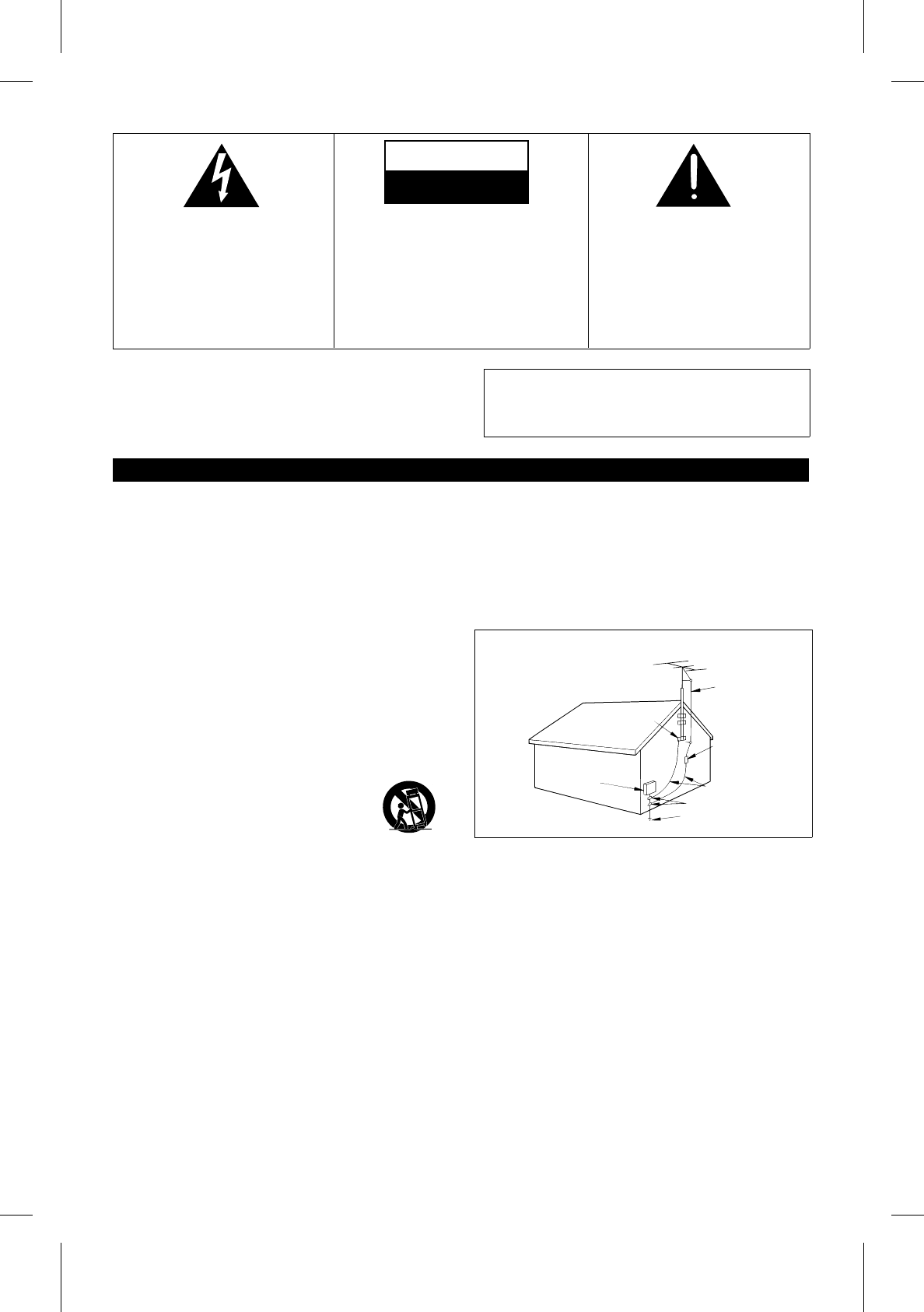
CAUTION
RISK OF
ELECTRIC
SHOCK
DO
NOT
OPEN
The lightning flash with arrowhead
symbol, within an equilateral triangle,
is intended to alert the user to the
presence of uninsulated "dangerous
voltage" within the product’s enclosure
that may be of sufficient magnitude to
constitute a risk of electric shock to
persons.
CAUTION: TO REDUCE THE
RISK OF ELECTRIC SHOCK, DO
NOT REMOVE COVER (OR
BACK).
NO USER-SERVICEABLE PARTS
INSIDE. REFER SERVICING TO
QUALIFIED SERVICE PERSON-
NEL.
The exclamation point within an equi-
lateral triangle is intended to alert the
user to the presence of important op-
erating and maintenance (servicing)
instructions in the literature accompa-
nying the appliance.
WARNING: TO REDUCE THE RISK OF FIRE
OR ELECTRIC SHOCK, DO NOT EXPOSE
THIS APPLIANCE TO RAIN OR MOISTURE.
IMPORTANT SAFEGUARDS
CAUTION
All the safety and operating instructions should be read be-
fore the appliance is operated, and should be retained for
future reference.
Electrical energy can perform many useful functions. This
unit has been engineered and manufactured to assure your
personal safety. Improper use can result in potential electrical
shock or fire hazards. In order not to defeat the safeguards,
observe the following basic rules for its installation, use and
servicing.
ANTENNA LEAD
IN WIRE
ANTENNA DISCHARGE
UNIT
(NEC SECTION 810-20)
POWER SERVICE GROUNDING
ELECTRODE SYSTEM
(NEC ART 250, PART H)
GROUNDING CONDUCTORS
(NEC SECTION 810-21)
GROUND CLAMPS
NEC - NATIONAL ELECTRICAL CODE
S2898A
ELECTRIC
SERVICE
EQUIPMENT
GROUND
CLAMP
EXAMPLE OF ANTENNA GROUNDING AS PER
NATIONAL ELECTRICAL CODE
1 Heed Warnings - All warnings on the appliance and in the oper-
ating instructions should be adhered to.
2 Follow Instructions - All operating and use instructions should be
followed.
3 Water and Moisture - The appliance should not be used near
water - for example, near a bathtub, washbowl, kitchen sink, laun-
dry tub, in a wet basement, or near a swimming pool, etc.
4 Carts and Stands - The appliance should be used only with a
cart or stand that is recommended by the manufacturer.
• An appliance and cart combination should be
moved with care.
Quick stops, excessive force, and uneven sur-
faces may cause the appliance and cart combi-
nation to overturn.
5 Wall or Ceiling Mounting - The appliance should be mounted to
a wall or ceiling only as recommended by the manufacturer.
6 Ventilation - The appliance should be situated so that its location
or position does not interfere with its proper ventilation. For ex-
ample, the appliance should not be situated on a bed, sofa, rug,
or similar surface that may block the ventilation openings; or,
placed in a built-in installation, such as a bookcase or cabinet
that may impede the flow of air through the ventilation openings.
7 Heat - The appliance should be situated away from heat sources
such as radiators, heat registers, stoves, or other appliances (in-
cluding amplifiers) that produce heat.
8 Power Sources - The appliance should be connected to a power
supply only of the type described in the operating instructions or
as marked on the appliance.
9 Power-Cord Protection - Power-supply cords should be routed so
that they are not likely to be walked on or pinched by items placed
upon or against them, paying particular attention to cords at plugs,
convenience receptacles, and the point where they exit from the
appliance.
10 Do not use liquid cleaners or aerosol cleaners. Use a damp cloth
for cleaning.
11 Power Lines - An outdoor antenna should be located away from
power lines.
12 Outdoor Antenna Grounding - If an outside antenna is connected
to the receiver, be sure the antenna system is grounded so as
to provide some protection against voltage surges and built-up
static charges. Section 810 of the National Electrical Code,
ANSI/NFPA No. 70-1984, provides information with respect to
proper grounding of the mast and supporting structure, grounding
of the lead-in wire to an antenna discharge unit, size of grounding
conductors, location of antenna-discharge unit, connection to
grounding electrodes, and requirements for the grounding elec-
trode.
13 Nonuse Periods - The power cord of the appliance should be
unplugged from the outlet when left unused for a long period of
time.
14 Object and Liquid Entry - Care should be taken so that objects
do not fall and liquids are not spilled into the enclosure through
openings.
15 Damage Requiring Service - The appliance should be serviced
by qualified service personnel when:
A The power-supply cord or the plug has been damaged; or
B Objects have fallen, or liquid has been spilled into the appliance;
or
C The appliance has been exposed to rain; or
D The appliance does not appear to operate normally or exhibits a
marked change in performance; or
E The appliance has been dropped, or the enclosure damaged.
16 Servicing - The user should not attempt to service the appliance
beyond that described in the operating instructions. All other ser-
vicing should be referred to qualified service personnel.
17 Grounding or Polarization - Precautions should be taken so that
the grounding or polarization means of an appliance is not de-
feated.
HT-DD5000(SEC) TINSE0009SJZZ
1


















